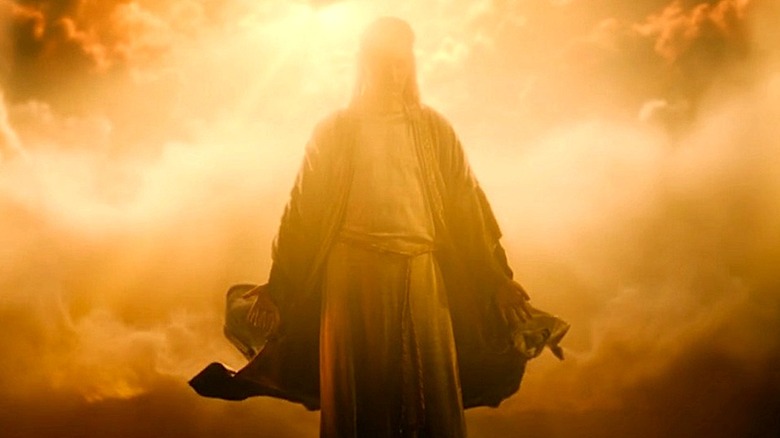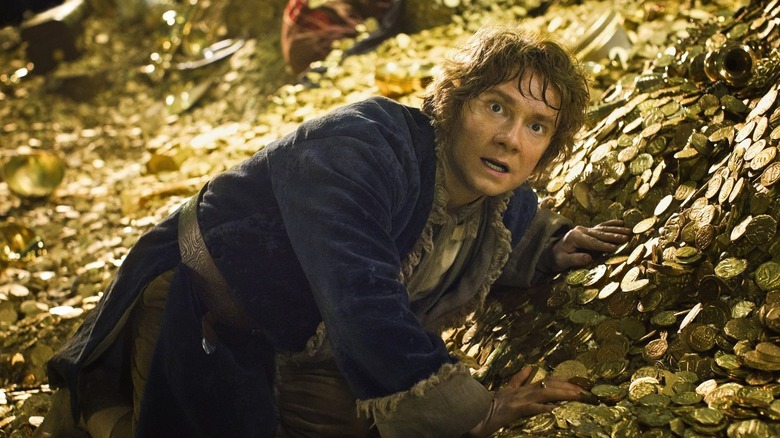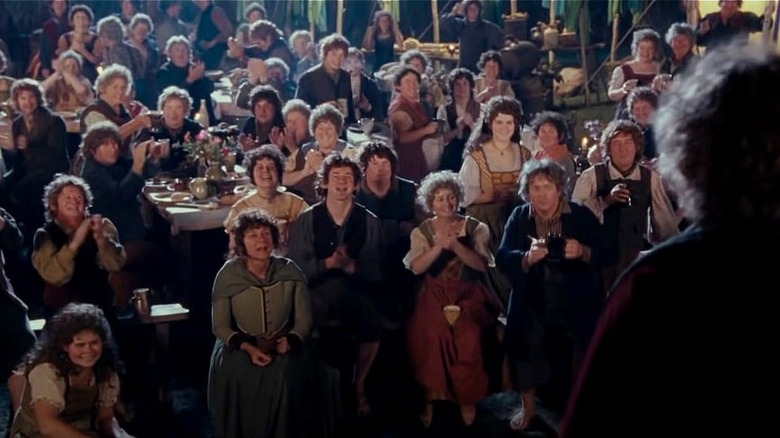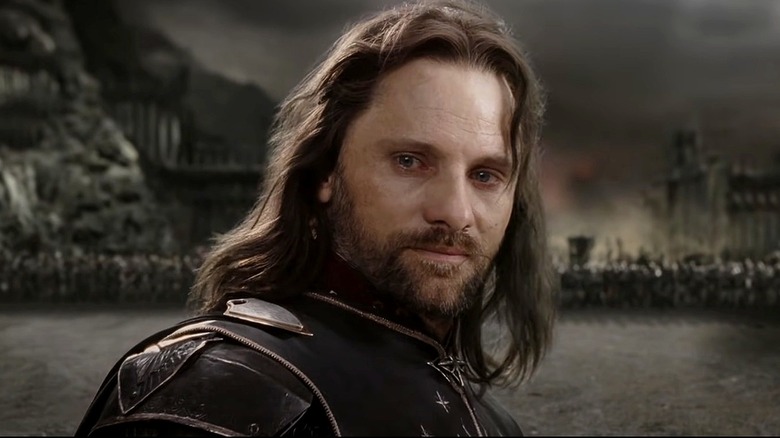Lord Of The Rings: Is This Middle-Earth's Golden Age - Or Its Apocalypse?
"Lord of the Rings" and its surrounding canon are collectively the greatest fantasy story in the history of humanity. Full stop. I mean it. (If you're reading this, I'm willing to bet you agree.) Middle-earth is also becoming one of the older stories out there. Sure, you can always go way back, but a century is a pretty impressive amount of time for a tale to not just survive but continue to grow in popularity. "The Hobbit" was published in 1937, and Tolkien began writing a portion of "The Silmarillion" (the story called "The Fall of Gondolin") twenty years before that. The roots of this IP really are over a century old at this point, and Middle-earth has never been more in the spotlight.
There are the obvious tentpole events, like Amazon Studios' "The Rings of Power" series, which just dropped Season 2. Warner Bros. is gearing up to roll out its long-awaited anime movie "The War of the Rohirrim," too. The studio is also working on a Gollum movie slated for 2026 and has a pipeline of other films ready to go. Magic the Gathering reimagined Lord of the Rings characters for the game last year, and there is a Tales of the Shire video game slated to release later in 2024. There are other games in the works, and rumors of things like a Middle-earth theme park are regularly circulating. I know I'm skipping over some other things, too. Suffice it to say, this IP is cranked up to eleven and is producing content of every kind at a rapacious rate.
The question is, does the amping up of Middle-earth adaptations bode well for Tolkien's beloved literary world? Is it the sign of better things to come, or a warning that we're approaching critical mass? To put it another way, are we entering a Golden Age of Middle-earth media, or are we facing its apocalypse?
Middle-earth is being milked for all it's worth
I'm a big fan of looking at a question from multiple angles. That said, before I get into the nitty-gritty details and try to answer the premise, I want to acknowledge something. While there are lots of fun projects to look forward to, there's no doubt the Middle-earth IP is being milked for all it's worth. Every single one of the things listed above has profitability at the core of its genesis.
Nowhere has this been more directly acknowledged than when Warner Bros.' CEO David Zaslav directly stated (via TheWrap), "For us, the challenge is that our content, our great IP — 'Harry Potter,' DC, 'Lord of the Rings' — that content has been underused." With so many projects in the works, hearing that one of the key forces behind Middle-earth media creation believes the IP is "underused" means we should be gearing up for every kind of adaptation, movie, show, game, and form of merchandise possible in the coming years.
For the record, I don't like this. I don't like when commercialism drives creativity. It's a common criticism, and one that will never stop being an issue. Elijah Wood brought this up when he commented on Warner Bros.' new Middle-earth movies, telling GQ, "Obviously at the core of that, is a desire to make a lot of money. It's not that a bunch of executives are like, 'Let's make really awesome art.'" That said, Woods clarified that great art can come from commerce, as long as the motivating factor is reverence for the source material — in this case, Tolkien's world.
This tension between commercialism and art is why purists form their opinions and want their favorite stories to remain unsullied by the corrupting influence of corporate greed. It's a valid opinion, and one that I partially subscribe to. That said, I haven't called myself a "purist" in years specifically because, when taken too far, that attitude can spoil the entire experience, not just with adaptations but with the fandom as a whole. Besides, I have a counterpoint to consider.
Is excessive attention always a bad thing?
Tolkien's world is too good to leave on the shelf forever. I don't even say that as an opinion — it's a reality. Creatives want to explore, adapt, and add to this incredible world, which means, like it or not, it is going to be opened and explored by someone sooner or later. The question worth asking is, is it really universally and comprehensively bad to have so much attention and investment pouring into an IP that we all love? I would challenge that the answer, at the least, isn't a clear-cut "no." There are pros and cons to having so much profit-centered focus on an IP.
"Star Wars," for example, stayed relatively quiet for decades after the first trilogy came out. Then, it came roaring back a quarter of a century ago, only to receive heavy criticism from its fandom. Countless other IPs have had similar trajectories. And yet, along with the many who are deeply upset about its evolution, there are "Star Wars" fans out there who actually like (or at least are fine with) where the IP stands. The truth is, if it weren't for the derided comeback attempts and genuinely low-quality productions we've seen at times, we wouldn't have gotten some of the better creative moments in recent history, too, like "Andor" or that fun first season of "The Mandalorian."
In that case, too, Lucas' entire world is dependent on and built from the first three movies. In contrast, Middle-earth's roots are much deeper. They are built on a textual canon that took a lifetime to create. They are already considered iconic 20th-century literature. Critically, this gives fans the original source material to go to at any time, regardless of whether they like or hate an adaptation.
Golden age or apocalypse?
Of course, we won't know the truth of Middle-earth's status until we get a bit further into the upcoming cascade of content, and even then, it'll be largely speculative and likely polarizing. Still, I would venture to say that the question of whether this will be a golden age or a dark one depends not on creatives making fleeting adaptations over time, but rather on the attitude of the fandom. Can we collectively embrace the fun of building on past triumphs of fantasy literature, judge each work on its own merits, and then move on? Or do we need to attack each non-canon iteration as if it's a virus that has entered our body?
Remember, we will always have the immovable foundation of stories that flowed directly from Tolkien's pen (along with a little help from his son, Christopher), and that will never change. They are embedded in our individual and collective consciousnesses, no matter what creatives decide to do with the IP in the future. This opens up the doors for the rest of us to sit back and enjoy each Middle-earth adventure within its own microcosm of existence in the larger Middle-earth collection. It doesn't have to turn into a fact-checking homework assignment, a political proxy war, or a chance to vent unnecessary hate and aggression. (No joke, I recently saw a review for a Middle-earth project that included the line "Where Hope Dies." Dramatic much?) Trust me. It's okay to relax and collectively take in the uniquely varied experience that each creative group comes up with, be it a serialized story in the Second Age, an anime from the Third Age, a card game, or anything else.
It isn't every day that a fandom gets to have so many creative resources and energy poured into its world. It'll be over at some point — enjoy this while it lasts.



